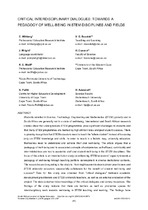| dc.contributor.author | Bozalek, Vivienne | |
| dc.contributor.author | Winberg, Christine | |
| dc.contributor.author | Conana, Honjiswa | |
| dc.contributor.author | Wright, J | |
| dc.contributor.author | Wolff, K | |
| dc.contributor.author | Pallit, N | |
| dc.contributor.author | Adendorff, H | |
| dc.date.accessioned | 2019-07-02T12:58:33Z | |
| dc.date.available | 2019-07-02T12:58:33Z | |
| dc.date.issued | 2018 | |
| dc.identifier.citation | Winberg, C., Bozalek, V. G., Conana, H., Wright, J., Wolff, K.E., Pallitt, N., & Adendorff, H. (2018). Critical interdisciplinary dialogues: Towards a pedagogy of well-being in STEM disciplines and fields. South African Journal of Higher Education, 32(6), 270–287. DOI: https://doi.org/10.20853/32-6-2975 | en_US |
| dc.identifier.issn | 1753-5913 | |
| dc.identifier.uri | https://doi.org/10.20853/32-6-2975 | |
| dc.identifier.uri | http://hdl.handle.net/10566/4700 | |
| dc.description.abstract | Students enrolled in Science, Technology, Engineering and Mathematics (STEM) globally and in South Africa are generally not in a state of well-being. International and South African research studies show that undergraduate STEM programmes pose significant challenges to students and that many STEM programmes are marked by high attrition rates and poor student success. There is growing recognition that STEM educators need to teach the “whole student” instead of focussing only on STEM knowledge and skills. In order to teach in a holistic way, university educators themselves need to understand and achieve their own well-being. The article argues that a pedagogy of well-being and its associated concepts of competence, self-efficacy, community and inter-relatedness are key to academic staff and student well-being in the STEM disciplines. The focus of this article is an inter-institution study on enhancing STEM educators’ capacity towards a pedagogy of well-being through teaching portfolio development in diverse institutional contexts. The research question guiding is the study is: How might academic development practitioners and STEM university educators successfully collaborate for the benefit of student well-being and success? Data for this study was obtained from “critical dialogues” between academic development practitioners and STEM university teachers, as well as an external evaluation of the project. The data comprise video-recordings of the critical dialogues and survey responses. The findings of the study indicate that there are barriers as well as productive spaces for interdisciplinary work towards well-being in STEM teaching and learning. The findings have implications for how STEM academics might engage in professional learning towards pedagogical competence, and offer suggestions for the ways in which academic developers might respectfully “transgress” into STEM disciplinary domains in support of a pedagogy of well-being in the STEM disciplines and fields. | en_US |
| dc.language.iso | en | en_US |
| dc.publisher | South African Journal of Higher Education | en_US |
| dc.subject | Pedagogical competence | en_US |
| dc.subject | Well-being | en_US |
| dc.subject | Student experience | en_US |
| dc.subject | Interdisciplinary collaboration | en_US |
| dc.title | Critical interdisciplinary dialogues: Towards a pedagogy of well-being in stem disciplines and fields | en_US |
| dc.type | Article | en_US |

